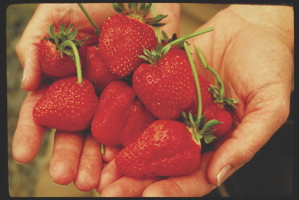 Summer officially started this week, finally. This month has set a record for the wettest June ever and it isn’t over yet. The same cool, gray weather that has been depriving us of vitamin D is also really cutting into berry farm revenue.
Summer officially started this week, finally. This month has set a record for the wettest June ever and it isn’t over yet. The same cool, gray weather that has been depriving us of vitamin D is also really cutting into berry farm revenue.
BY JOSEY BARTLETT
Summer officially started this week, finally. This month has set a record for the wettest June ever and it isn’t over yet. The same cool, gray weather that has been depriving us of vitamin D is also really cutting into berry farm revenue.
“We are down 50% right now in profits. I’m not worried about the economy as much as I’m about the weather,” says Don Wachlin, owner of Schlichting Century Farm in Sherwood.
“It’s a tough year. It is anticipated that yields will be down,” says Dr. Bernadine Strik, professor of horticulture at Oregon State University.
Oregon’s berry business is sizable — in 2008 the crops had a farm value of $140 million. With 8,000 acres of blackberries, Oregon is the largest blackberry producer in the nation. The forecast is for smaller yields this year because of the cold and rain.
 The strawberry harvest is usually done during a 14- to 28-day period in mid-June. But the coolest May in 116 years and the June rain is creating an under-ripe and rotting crop. Also, the thick mud in the fields is sinking the usual harvesting machinery so some farms are using their older but lighter harvesting tools that farmers thought they had retired for good.
The strawberry harvest is usually done during a 14- to 28-day period in mid-June. But the coolest May in 116 years and the June rain is creating an under-ripe and rotting crop. Also, the thick mud in the fields is sinking the usual harvesting machinery so some farms are using their older but lighter harvesting tools that farmers thought they had retired for good.
Blueberry farms also are facing challenges from rain, hail and green rot. It takes seven to eight years for blueberry plants to mature, making it the most expensive Oregon berry crop. A few years ago demand was up and farmers planted up a storm. These farms are all reaching maturity at the same time and profits are falling because of an over-supplied market. A crappy weather year is exactly what these farmers didn’t need.
Not only has the rain delayed ripening and stalled profits, but farmers must replant strawberries and some vegetables, which also eats into profits. “Usually the crops would be planted, but they aren’t. So now we will be playing catch up,” says Joe Casale, owner of Joe Casale & Son farm in Aurora.
Wholesale farms can tell their employees to work in the rain if the crop is ripe, but U-pick farms find it harder to motivate the public in crummy weather. “U-pickers don’t want to come in the mud,” says Cheryl Boden, president of Tri-County Farm Fresh Produce, a 64-farm U-pick organization.
But Johnny Kondilis, owner of U-pick farm Bella Organic in Portland, is a bit more optimistic. “It’s just postponing profits,” he says. “Everything just got pushed back a bit.”
Josey Bartlett is an associate writer for Oregon Business.


